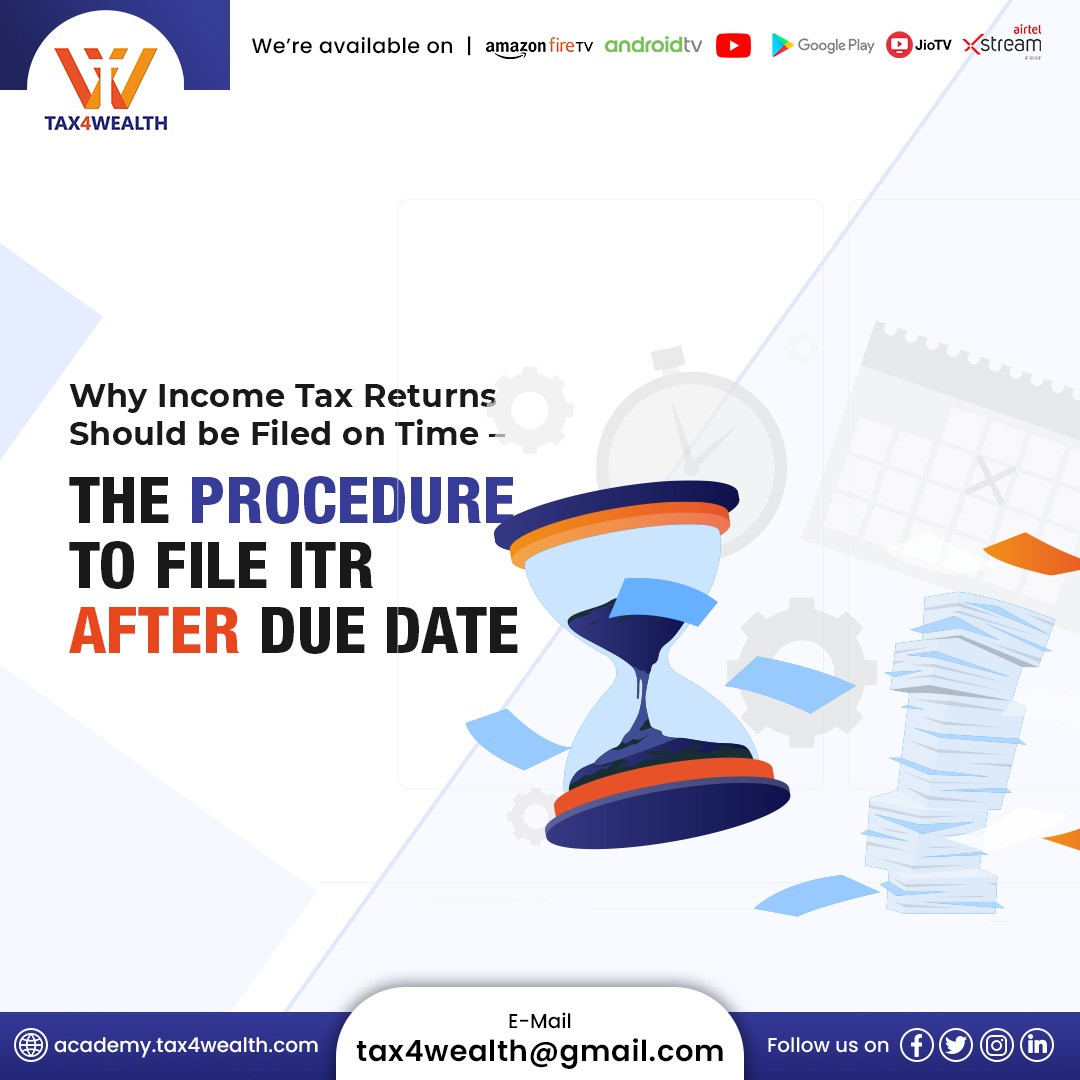
The Procedure to File ITR After Due Date
What is an Income Tax Return?
ITR (Income Tax Return) is a tax return form that individuals in India use to report their income and assets to the IT division. It includes data on the monetary and personal circumstances of the taxpayers. Fundamentally speaking, an ITR is a taxpayer's self-declaration of their earnings, assets, refund they expect to receive, and proper taxes paid. Seniors have the option of completing it manually, though it is typically done online.
Who Must File an Income Tax Return?
ITR filing is not compulsory for everyone. A taxpayer's decision on whether they must file an ITR depends on several factors. Here are these components:
• A person who owns assets outside of India and receives income from them, or whose income exceeds the exemption limit of 2.5 lakhs, 3 lakhs, or 5 lakhs as per the appropriate taxable limit, is required to file an ITR.
• In a fiscal year, anyone who pays more than Rs. 1 lakh in power costs is required to file an income tax return.
• Assesses must submit an ITR if they deposit more than Rs. 1 crore in one or more bank accounts during a fiscal year.
• Expenses for international travel: You must submit an income tax return if you spent more than $2,000 on international travel during the fiscal year.
However, as was already said, there are numerous advantages to filing your tax returns on time; for this reason, whether you are a taxpayer, you must file your ITR.
Learn Online ITR Filing at affordable price click here; Income Tax Return (ITR1, ITR2, ITR4) Practically
3. Top Advantages of e-Filing Income Tax Returns in India on Time:
Avoid Penalty-
By finishing it by the deadline, people and companies might avoid paying hefty fines. If you submit your ITR beyond the due date, a late fee of up to INR 5,000 may be assessed. It comes in addition to any other fines the Act may impose. Additionally, you might have to pay the penalty's interest charge.
Accidental Claim-
If you continue to file ITRs for yourself or your spouse, it will be beneficial if you ever have an accident. Insurance companies need proof of income to compute the claim amount, and if any returns are missing, particularly from the last three years, the claim amount may be lowered or even refused because the court only considers ITRs as evidence.
Evidence of Net Worth
The most reliable evidence of your net worth or income is your ITR. Form 16 is used by the salaried class as proof of income and is produced by their employer. On the other hand, self-employed individuals may utilize the ITR filing form as evidence of income. It gives a detailed account of these people's earnings and outlays for each fiscal year.
Receive a Refund
You must file tax returns if your TDS refund that was previously withheld is owed; otherwise, you will have to relinquish the refund. Some taxpayers might favor making major investments in fixed deposits. On these investments, tax is withheld at the source (TDS), which is close to 10%.
Eligibility in Loan Application:
Regular ITR filing shows the constant income and proves that the taxpayer has been making timely tax payments. Financial institutions review an applicant's prior year ITRs to approve loans and other credit lines, such as overdrafts, bank credit cards, cash credits, and bill discounting alternatives. If you are unable to provide any documentation—including an ITR—that the lender or bank deems appropriate, your home loan application may be rejected.
Carry Forward Losses-
Taxpayers must submit a tax return by the deadline to claim specific losses that may arise because of capital gains, a business, and losses under the Income from Household Property head. For instance, by timely filing your tax returns, you can use losses from prior years to offset any profits you gained on the sale of stocks or mutual funds.
Protection from illegal money-
The government has taken several actions in recent years to combat black money and restrict money exports from India. With this objective in mind, the government required taxpayers to disclose any foreign assets they held in their annual income tax filings for the fiscal year 2011–12.
Start-up Financing-
Financial institutions could ask to see your profits from the past few years before providing cash for your start-up. To make sure their money is going to the proper people, these financial institutions and investors will want to review your business's scalability, profitability, and other cost metrics from your business income tax return. It also acts as proof that a person is a citizen who pays taxes to the nation.
Also, read; How to File an Income Tax Return( ITR)
Credit Card Application-
Regardless of the type of profession, they are involved in, practically everyone wants a credit card as a financial tool. If there are issues with other income evidence, one of the key documents that one must provide is an income tax return. The Credit Information Bureau (India) Limited (CIBIL) score used to assess a taxpayer's credit history is another important factor that is determined by ITR.
Application for Visa-
Most countries want ITR as one of the documents before providing a visa to a candidate. This provides information about your current financial condition and income to the people handling your visa. The embassy will examine the applicant's financial situation and certify that they can afford the costs. The current year's income tax return or the returns for the previous three years are frequently requested by foreign consulates. The absence of any form of return can make it more difficult for you to get a visa, especially if you're requesting a work, investor, or visitation permit. If you intend to visit the United States, the United Kingdom, Canada, Europe, or Southeast Asia, you must do this.
4. What happens if a tax return is not submitted on time?
The maximum penalty for filing an ITR after the required date, as per the updated regulations announced under section 234F of the Income Tax Act, is Rs 5,000. The maximum fine for filing tax returns after the deadline has been decreased by the IT department from Rs 10,000 to Rs 5,000 starting in FY 2021.
5. Why do lenders for loans request a copy of the ITR?
Income Tax Returns must be submitted to receive formal loan approval. Even better, this makes the procedure go smoothly and easily. It could be difficult for people to get their loans approved by institutional lenders if they do not file an ITR.
6. Can I now file income tax returns spanning the previous three years?
No, you are unable to submit an income tax return for the last three years at once. If your ITR filing deadline has passed, you may still file tax returns with a penalty using the "Belated Return" option, which was first made available by the Finance Act of 2017.
7. Can I File ITR after the due date?
According to Section 139(4) of the Income Tax Act of 1961, taxpayers may file their tax returns after the deadline if they pay a late filing penalty.
8. Is it possible to make changes to section 139(4) income tax returns?
ITRs submitted after the deadline cannot be changed. A loss return, however, may be subject to amendment if it was submitted before the date specified in section 139(1).
9. Is filing an ITR required?
If a person's personal or corporate total sales or turnover for the preceding year exceeded Rs. 60 lakhs, he or she is required to file tax returns. If the total gross income from a person's occupation exceeded Rs 10 lakh the previous year, they must additionally file tax filings.
For more information, Visit us at: https://academy.tax4wealth.com/
No comments yet, Be the first to comment.













